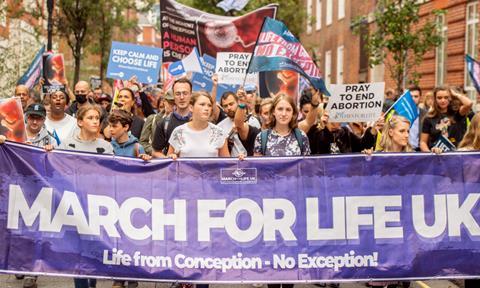With a record 250,000 abortions now taking place in England and Wales per year, the pro-life cause appears to be losing ground. But could the next generation of pro life activists succeed where elder generations have failed?

A record number of people attended the March for Life in London on Saturday, with organisers estimating as many as 10,000 people joined the cause.
The annual event gathers those calling for an end to abortion in the UK. But in the ten years of the march, there has been a noticeable trend: as well as increasing in overall numbers, the attendees are becoming considerably younger.
“When I first got involved in pro-life work 20 years ago, it was hard to meet other young pro-lifers,” recalls prominent activist, Isabel Vaughan-Spruce. “Even when we ran the first March for Life in Birmingham ten years ago, I recall encouraging young people to come to the front when we took photos, but now I’d never need to say that. At the March for Life in London we are flooded with young adults as well as lots of young parents with their children.”
A brighter future?
A number of new movements against abortion have been started by young adults in recent years. Abortion Resistance aims “to provide pro-life youth with regular activism and tangible goals towards ending abortion” according to the website. Another, Project Truth, sprung from the well-known charity Society for the Protection of Unborn Children (SPUC), and takes teams of as many as 18 young people to the streets of Scottish towns and cities to persuade people against abortion. There are also increasing numbers of pro-life student groups, despite being the target of aggressive pro-choice protests or even facing bans from university authorities.
“Over the last two years, I’ve met so many other young pro-lifers at March for Life, the SPUC Youth Conference, and at pro-life university societies,” says 22-year-old student Theo Hepburn. “This has filled me with confidence for the future. However, we’ve also experienced a lot of intense pushback from other people our age, especially at university. I know people who are sympathetic to our cause but who are afraid to speak out, so it’s important to lead by example and show that it’s possible to be young, bold, and pro-life.”
Activists credit the resurgence in interest to a number of factors. Vaughan-Spruce believes it is due to the high numbers of women who have had an abortion and suffered, especially since “pills by post” became legal in 2020 and women experienced seeing their own aborted unborn child alone at home. “When these individuals and those close to them recognise how damaging abortion is, this can often motivate them to get involved in pro-life work in an effort to prevent others believing the lies they were sold,” she says. “Many, many people I speak to at the march or involved in other pro-life work are motivated by a personal experience.”
Paul Gardner, a 25-year-old in the technology industry, said he was inspired to join the pro-life cause at a March for Life in 2018. He was struck by the statistics on the large numbers of abortions in the UK (the figure has since risen in England and Wales from 200,000 in 2018 to 250,000 in 2022), and the presence of several children whose lives had been saved from abortion by adults who were present, who had offered the mothers support. “Those experiences showed me immediately that the battle was not distant, it wasn’t a loss, and it had a right to be made a priority,” he said. “From what I understand, Gen Z is pretty open to activism, and I’ve certainly met some highly enthusiastic Gen Z pro-lifers.”

A quiet church
As Premier Christianity has previously reported, the British evangelical church has faced accusations of failing to address this issue, and the subject is rarely preached from the pulpit. This can lead to shock and surprise for young Christians when they first learn about it. “People my age and younger grew up in a total silence when it comes to abortion,” says one of the most strident voices on the subject, 34-year-old Dave Brennan, who leads Brephos, the church-facing arm of pro-life charity CBR UK, which takes teams onto the streets with pictures of aborted fetuses. “None of us got teaching on it in church. So we came to the issue with a blank slate, perhaps rather than the jaded, defeated, or theologically confused, compromised slant that people older than us did.”
He also credits new technology that gave much clearer images of the unborn child, and more concern for justice. “There’s also I suppose something of a conservative pushback amongst young people who’ve had enough of liberal nonsense rammed down their throats,” he says.
These bold voices do seem to be having an effect. One 21-year-old recent graduate, who preferred to be anonymous, said he’d previously had a ‘moderate’ pro-life stance until he was challenged. “I hadn’t realised how strong the biblical basis for the cause was, and instead of it being something of a fringe issue promoted by a Christian subculture, I realised it was a clear declaration from God,” he said.
Sexual revolution pushback
James Ascott, a 22-year-old charity worker, believes that observing the harms and today’s rapid moral deterioration caused by the liberal sexual revolution that is driving interest. “Gen Z have been more affected by our ‘post-Christian’ nation than the older generations,” he says. “Therefore, lots have bought into ‘woke’ ideology [progressive beliefs about sex and gender], but there are some who have swung the other way and see the damage that our country has caused because of its abandonment of the gospel.
“For this reason, they are more willing to do something about it… based off experience I think there are less people in the older generation than Gen Z who have the cultural and spiritual awareness to fight back against the war on Christianity because they have not experienced as much of the devastation that our society has caused by leaving Jesus.”
Gen Z is laying the groundwork… so our grandkids can see an end to abortion
As with contraception and other key drivers of the ‘sexual revolution’ in the rebellious post-war years, some young adults see the new conservatism as their own counter-cultural movement. “There is an increased willingness in young people to question the assumptions of the 60s - including on abortion,” says 26-year-old Paul Sapper, who works for faith-based advocacy group ADF International. He became an evangelical Christian at university and then a Catholic. “There is also research that young people are having less sex than previous generations, which may allow some to view the issue of abortion more objectively, because they are not biased by thinking an abortion may be convenient for them in the future. Anecdotally, a lot of young people are also converting to Christianity and so adopt pro-life views. My story is not unique - there are many others like it.”
A social justice issue
Another influence is that Gen Z has been raised in an atmosphere that highly values social justice inside and outside the church. Figures such as Dietrich Bonhoeffer and William Wilberforce have been feted as Christian heroes for their steadfast battles against the evils and injustices of their age – yet young people perceive a disconnect with lauding these campaigners while ignoring the issue of abortion today. “In the words of Desmond Tutu; if you are neutral on situations of injustice, you have chosen the side of the oppressor,” said Natanya Squire, a 36-year-old who got involved with the cause after suffering from her own experience of abortion. “The time to stand up for life is now.”
Ascott says that CBR UK’s teaching on how abortion compares to other social injustices inspired him. “After seeing that, learning about the stats, how others have responded to injustices like slavery and reading about how God calls us to expose deeds of darkness in Ephesians 5:11, I was convicted to do something about it.”
Many older Christians believe it is a lost cause in our secular age. Can Gen Z succeed in making headway on this issue where older Christians have failed? “I don’t think this issue will be resolved in the lifetime of Gen Z, because of the direction of the abortion law and the elites,” says Sapper. “They are completely wedded to the idea of abortion being a ‘good’. However, Gen Z is laying the groundwork… so our grandkids can see an end to abortion.”
One argument is simply that the failure of the movement up until now has been due to the lack of support from the Church, so if more Christians engage with the subject, then that will lead to progress. “If you truly call yourself a Christian, you should be doing pro-life work, its as simple as that,” says Eden McCourt, a 26-year-old co-founder of Abortion Resistance. “Imagine the progress the pro-life cause would make if all Christians realised this.”







































1 Reader's comment